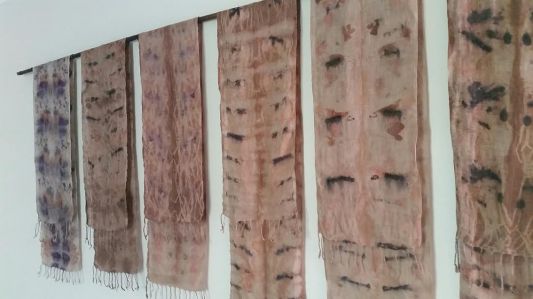Sourcing fibre that’s made and processed in Australia can be challenging. At the Air Raid tavern, Moruya I’d heard about a woman who kept an alpaca herd up on Larry’s Mountain Road.
Alpacas were introduced to Australia in the 1840’s but eventually died out. In 1989, a second wave of alpacas reached our shores. Alpacas fetched big money in their heyday – good breeding stock cost $30,000 each and upwards.
They are a south American animal and compared to a pet dog or cat, are long lived -surviving til their mid 20’s.
A female typically weighs around 70 kilos and is pregnant for 11 and a half months. Gosh.
Alpaca fibre is hollow, light weight and has good insulating properties. Unlike wool, it contains no lanolin and is a good option for people with allergies.
My partner warned me that all alpaca people are mad. I drove off with virtual hill-billy music ringing in my ears.
I met Lesley Maxwell from Kurralea Alpaca’s on a crisp Autumn morning. You could see the herd from her kitchen sink – grazing in a lush paddock dotted with towering gums.
After visiting the Royal Easter Show in 1994, Lesley and her husband started their own flock. They bought three. One of them was named Passionflower and produced a number of progeny – one of which I met yesterday.
For a number of years, Lesley ran ‘Absolutely Alpaca’ at Mogo. During that period, she had some of her fleeces converted into yarn.
Rather than sending the fleece to New Zealand, it was processed at Fibre Naturally, a small alpaca processor outside of Melbourne. Lesley wanted to be able to market her yarn as ‘Australian owned, grown and processed’.
Lesley says alpacas are much easier to keep than cattle. They require yearly vaccinations and six monthly worming. They are soft footed animals and their toe nails require clipping. And of course, they require a yearly shear.
Lesley was delightful and clearly enjoys her animals. The only music I heard was bird song.
Just like I want to know how my food is grown it was fabulous to stand amongst the Kurralea Alpaca herd.
To honour my slow and local fashion journey, I bought enough balls of 8 ply ecru yarn to make myself a garment.
Bring on the needles.
